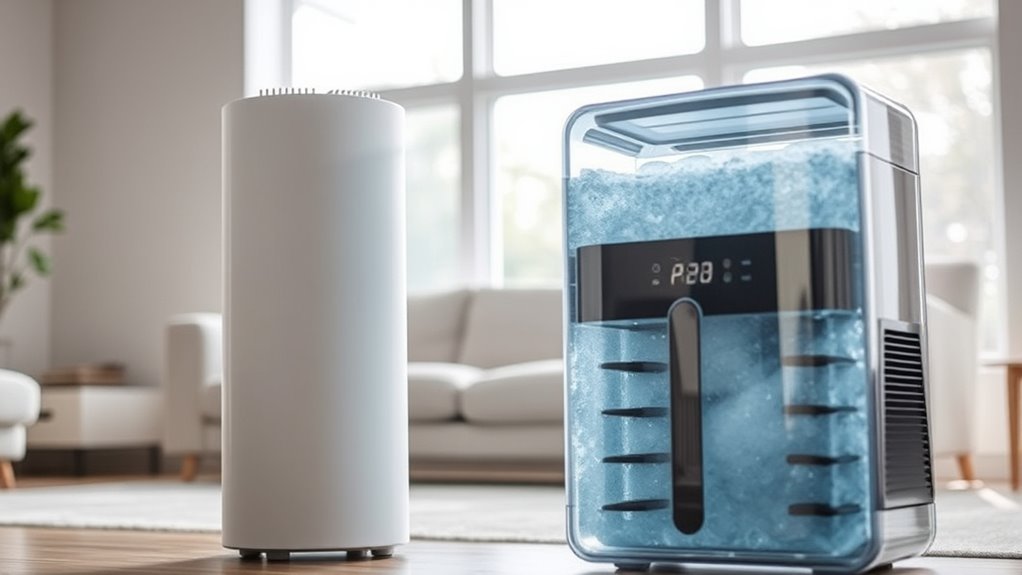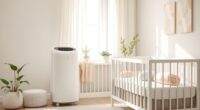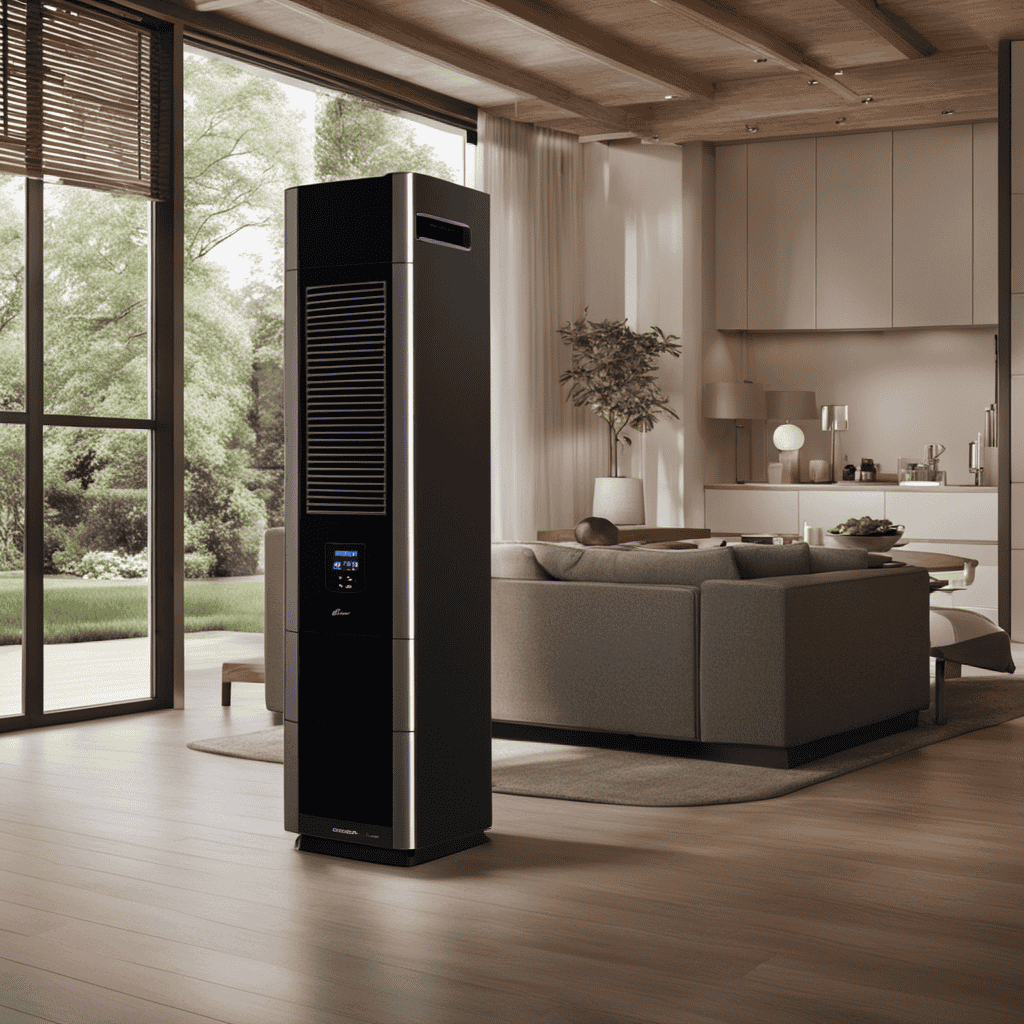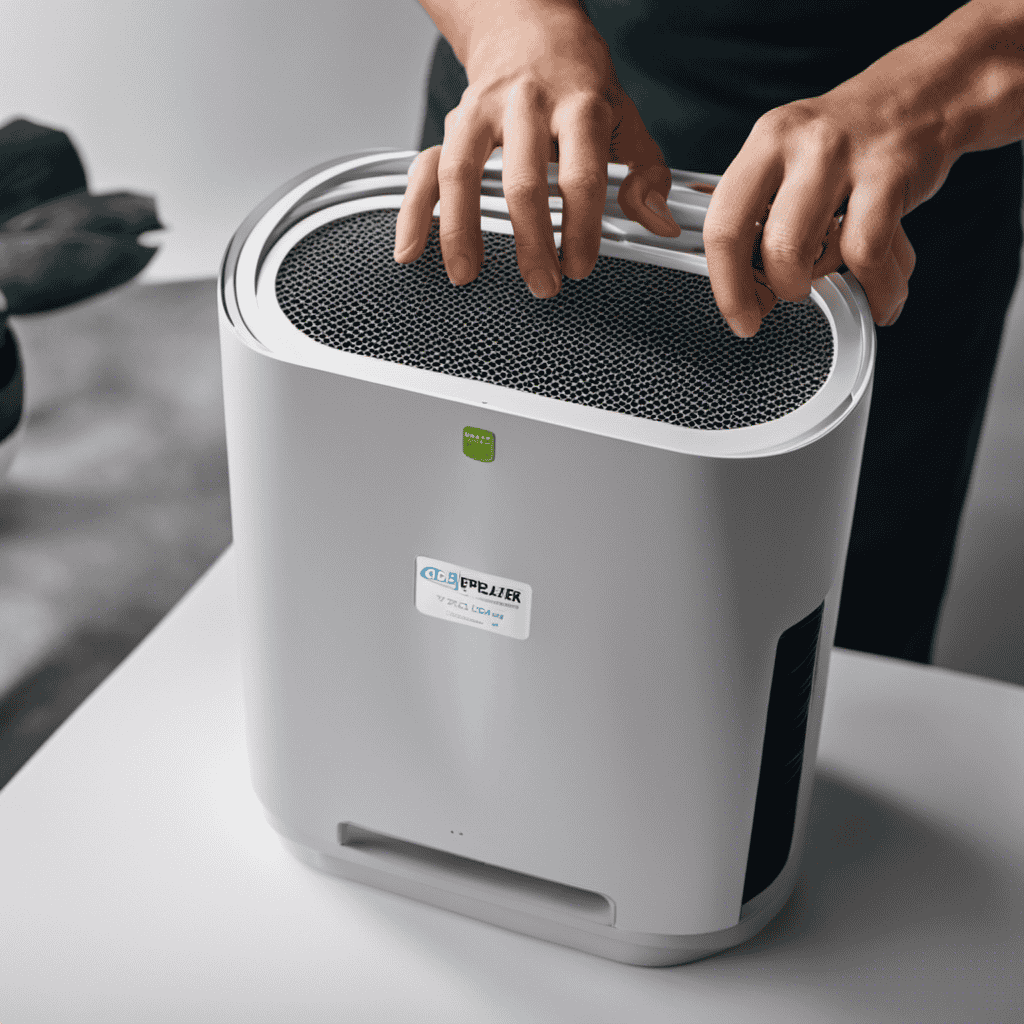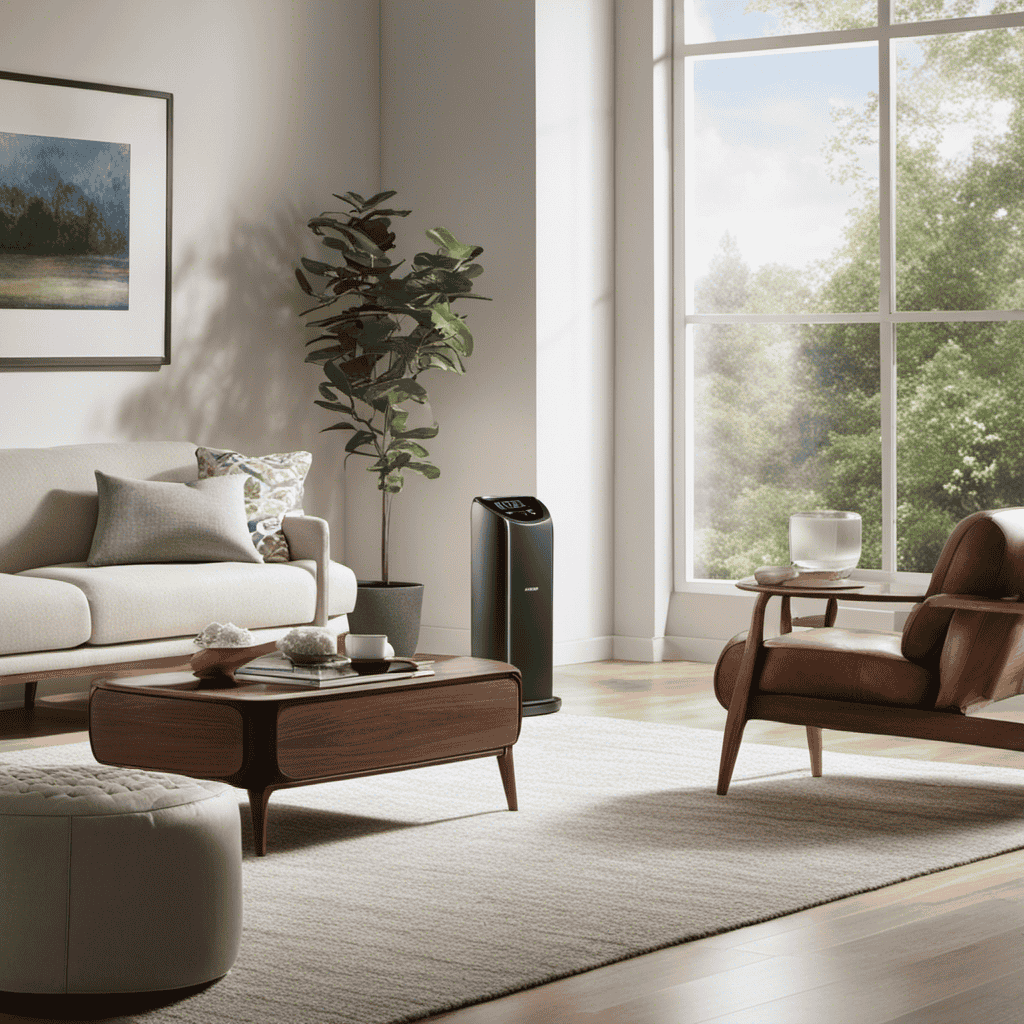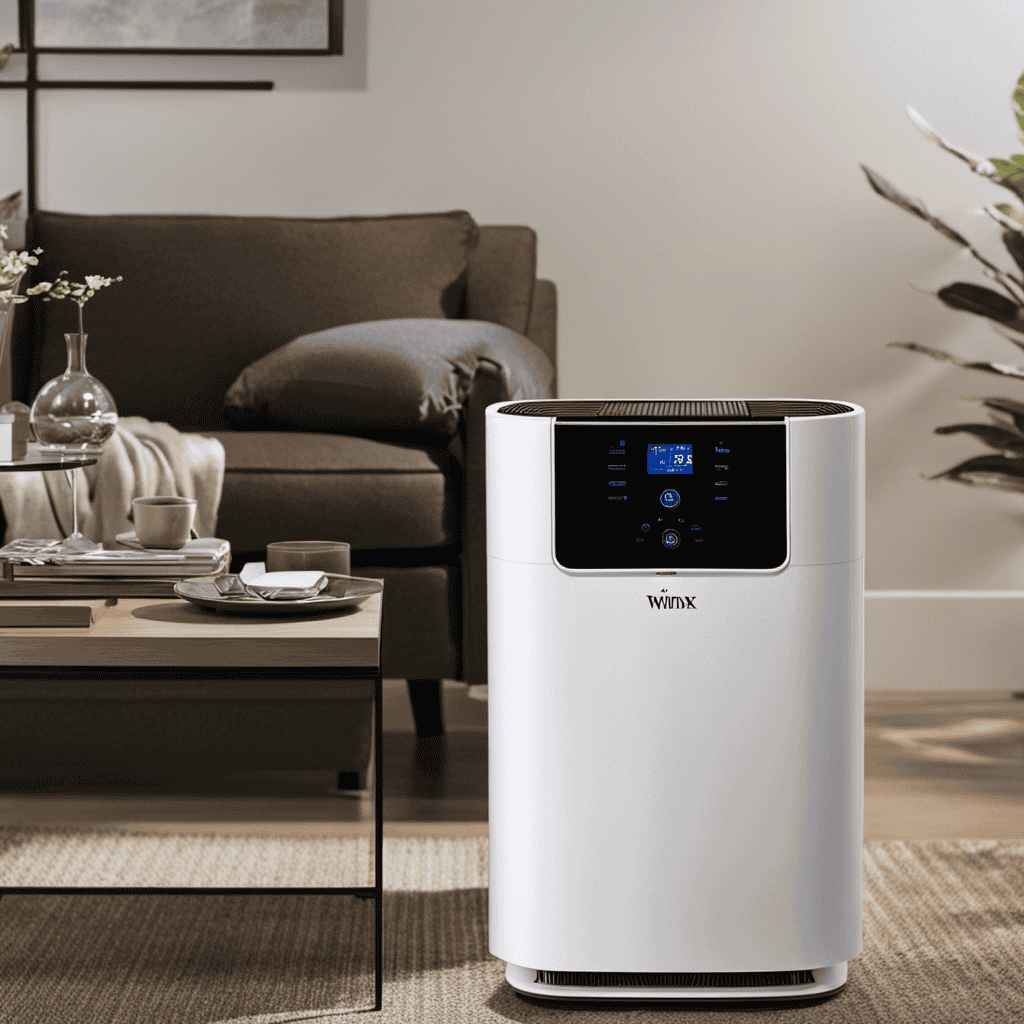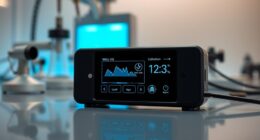Air purifiers and dehumidifiers serve different purposes to improve your indoor air. Air purifiers draw in air and use filters like HEPA to trap dust, allergens, and odors, making the air cleaner. Dehumidifiers, on the other hand, remove excess moisture to prevent mold and dampness. Knowing when to use each device can considerably enhance your home’s air quality. Keep exploring to find out which one best suits your needs.
Key Takeaways
- Air purifiers remove airborne pollutants, allergens, and odors, while dehumidifiers reduce excess moisture to prevent mold and dampness.
- Purifiers use HEPA and activated carbon filters; dehumidifiers actively extract moisture from the air.
- Use an air purifier for allergy and pollution concerns; choose a dehumidifier to control humidity and mold growth.
- Air purifiers generally consume less energy and operate continuously; dehumidifiers are ideal for high humidity environments.
- Selecting the right device depends on whether air quality or moisture control is the primary indoor concern.
How Air Purifiers Work to Clean the Air
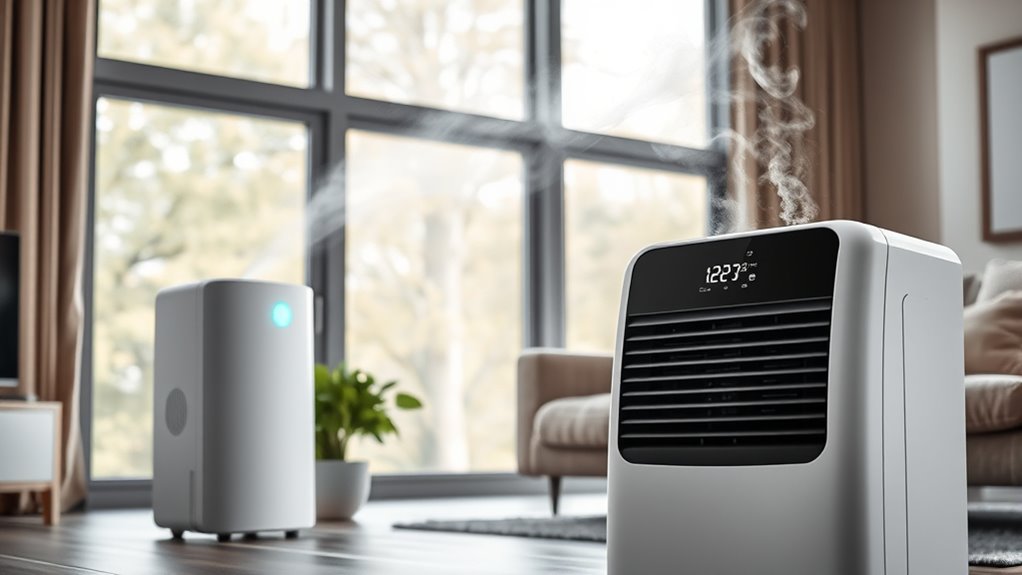
Air purifiers work by drawing in air and passing it through filters that trap pollutants, allergens, and airborne particles. This process considerably improves air quality inside your space, making it healthier to breathe. The filters, often HEPA, are designed to capture tiny particles like dust, pet dander, pollen, and smoke. By removing these allergens from the air, you reduce symptoms for allergy sufferers and create a cleaner environment overall. Many air purifiers also include activated carbon filters to absorb odors and chemical pollutants, further enhancing air quality. Regular use of an air purifier ensures that the air you breathe is free from common airborne irritants, making your indoor space more comfortable and safer, especially for those with allergies or respiratory issues. Incorporating air quality improvements like these can also promote better sleep and overall well-being. As the integration of automation technologies advances, some models are now equipped with smart sensors that adjust filtration levels automatically based on real-time air quality data.
The Role of Dehumidifiers in Moisture Control
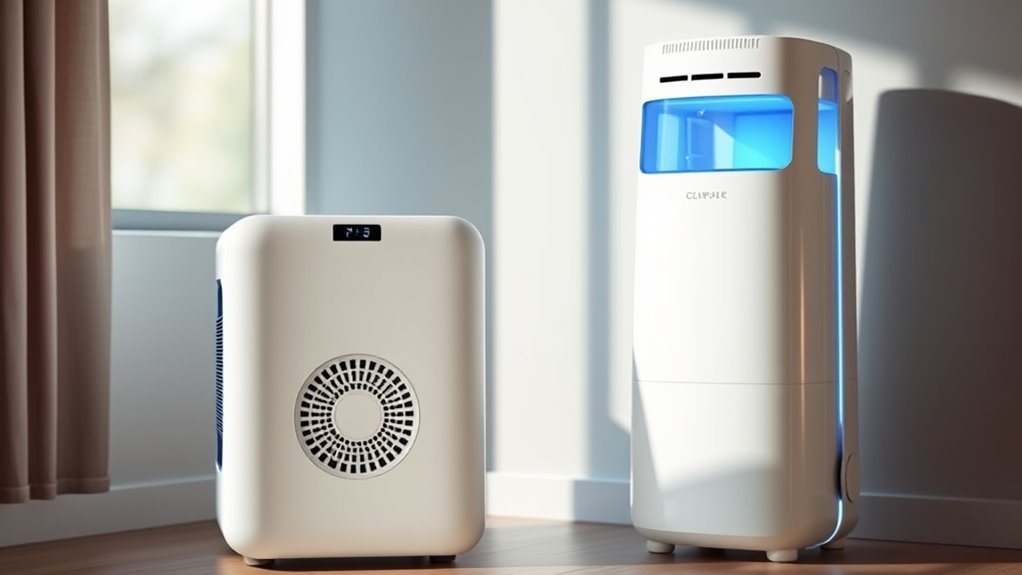
Dehumidifiers play a vital role in maintaining ideal indoor humidity levels by actively removing excess moisture from the air. Proper humidity control helps you create a comfortable environment and prevents issues like mold growth. By reducing moisture, dehumidifiers inhibit mold development, which thrives in damp conditions. This is especially important in basements, bathrooms, or areas prone to humidity buildup. Use the table below to understand key features of dehumidifiers:
| Feature | Benefit |
|---|---|
| Moisture Removal | Keeps humidity levels in check |
| Mold Prevention | Reduces mold risk in damp environments |
| Energy Efficiency | Saves on electricity while maintaining perfect moisture |
With consistent use, dehumidifiers make your space healthier and more comfortable.
Key Differences in Purpose and Functionality

While both air purifiers and dehumidifiers improve indoor air quality, they serve fundamentally different purposes. An air purifier mainly filters out pollutants, allergens, and odors to enhance air quality. In contrast, a dehumidifier reduces excess humidity, helping with humidity control and preventing mold growth. To clarify their roles:
- Air purifiers focus on cleaning the air by trapping particles and pollutants.
- Dehumidifiers regulate moisture levels to prevent dampness and mold.
- Both devices contribute to a healthier indoor environment, but target different issues.
- Filtration Technology such as HEPA filters plays a key role in the effectiveness of air purifiers.
Understanding these key differences helps you choose the right device for your needs. If you want cleaner, fresher air, an air purifier is your go-to. If humidity control and mold prevention are your goals, a dehumidifier is the better choice.
When to Use an Air Purifier Versus a Dehumidifier
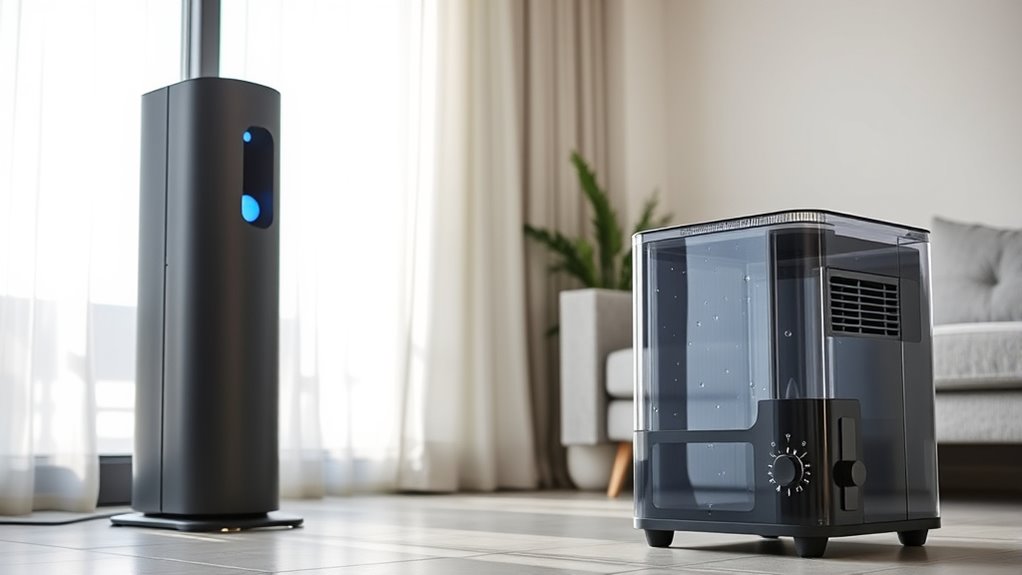
Choosing between an air purifier and a dehumidifier depends on the specific issues you want to address in your indoor environment. If poor air quality myths lead you to believe pollutants are your main concern, an air purifier is ideal for removing airborne particles, allergens, and odors. On the other hand, if excess humidity causes mold, musty smells, or mildew, a dehumidifier will help control moisture levels. Consider energy efficiency; air purifiers generally consume less power, making them suitable for ongoing air quality improvement. Use an air purifier when airborne contaminants are the primary problem, and opt for a dehumidifier when humidity-related issues dominate. Understanding your specific needs ensures you choose the right device for a healthier, more comfortable home. Additionally, selecting a device suited to your humidity levels can significantly enhance indoor air quality and comfort, especially since proper humidity management can also influence air quality.
Choosing the Right Device for Your Home Needs
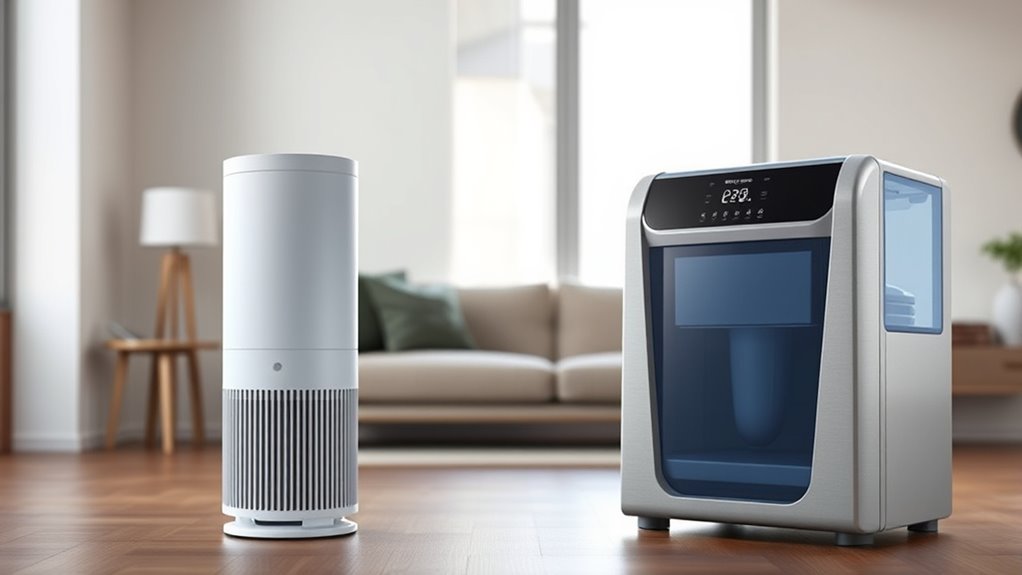
Evaluating your home’s specific needs is essential to selecting the right device. If indoor allergens trigger allergies or asthma, an air purifier may be your best choice. Conversely, if excess humidity causes mold or musty odors, a dehumidifier is more suitable. To make an informed decision, consider these key points:
- Indoor allergens: Determine if airborne particles like pollen, pet dander, or dust mites are a concern. Understanding air quality factors can help you identify the most effective solution.
- Moisture levels: Check humidity levels to see if dehumidification is necessary.
- Energy efficiency: Look for energy-efficient models to save on electricity bills and reduce environmental impact.
Understanding the industry trends can help you choose a device that not only fits your needs but also stays current with technological advancements.
Choosing the right device depends on your specific needs, home environment, and budget, ensuring a healthier, more comfortable space.
Frequently Asked Questions
Can Air Purifiers and Dehumidifiers Be Used Together Effectively?
You can definitely use air purifiers and dehumidifiers together for better air quality synergy. Combining these devices helps remove pollutants and excess moisture simultaneously, creating a healthier environment. The combined device benefits include reduced mold growth, less dust, and improved comfort. By working together, they target different air issues effectively, making your home safer and more comfortable. Just guarantee both devices are suitable for your space and needs for ideal results.
Do Both Devices Improve Indoor Air Quality Equally?
Like two sides of the same coin, both devices aim to improve your indoor environment. While air purifiers substantially enhance air quality by removing pollutants, dehumidifiers primarily reduce moisture, preventing mold and mustiness. They don’t improve air quality equally; device compatibility matters. You need both for overall air improvement, but they serve different purposes. So, understanding their roles helps you choose the right device for a healthier home.
Are There Health Risks Associated With Using Either Device?
You might wonder if using air purifiers or dehumidifiers poses health concerns. Generally, both devices are safe when used properly, but device safety depends on maintenance and quality. Poorly maintained filters in air purifiers can release dust or mold spores, causing health issues. Dehumidifiers with mold or bacteria buildup could also pose risks. Always follow manufacturer instructions and keep your devices clean to minimize health concerns and guarantee safe operation.
How Energy-Efficient Are Air Purifiers Compared to Dehumidifiers?
You wonder about energy consumption between air purifiers and dehumidifiers. Generally, air purifiers use less energy, making them more eco-friendly options for daily use. Dehumidifiers tend to consume more power due to their larger motors and continuous operation needs. To save energy, look for models with energy-efficient features or ENERGY STAR ratings. This way, you can keep your space comfortable without increasing your energy bills too much.
What Maintenance Is Required for Each Device?
Think of your devices as loyal gardeners needing care. For air purifiers, you’ll replace filters regularly to keep the air fresh, like pruning to promote growth. Dehumidifiers require descaling to prevent mineral buildup, much like clearing away weeds. Both need routine maintenance; neglecting these tasks dulls their performance. Stay vigilant, and your devices will serve you well, ensuring a healthier, more comfortable home.
Conclusion
Choosing between an air purifier and a dehumidifier is like selecting between a fresh breeze and a dry, desert air—you need what suits your home. If you want to breathe easier amid allergens, an air purifier is your ally. But if dampness makes your space feel heavy and musty, a dehumidifier clears the moisture. Each device paints a different picture, helping you create a healthier, more comfortable environment—tailored perfectly to your needs.
